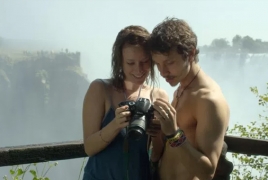
Brazilian helmer-scribe Fellipe Barbosa, whose sophomore feature “Gabriel and the Mountain” vies for the big prize at Cannes’ Critics’ Week, is set to helm his first English-language pic “City of Alex”, with Lars Knudsen of the Long Run Prods. (“The Witch,” “American Honey”), Variety said.
Other producers on board are Alex Sagalchik (“The Witch) of Mott Street Pictures, Tory Lenosky (“Loitering with Intent”) and German producer Jan Kruger from Port-au-Prince Films.
Set in Berlin, “City of Alex” pivots on a love triangle involving the titular Alex, a concert pianist who is torn between her husband Eric and Sasha, the lover and singer she left behind years ago.
“The film deals with the conflict between love and passion, discipline and freedom, classical music and jazz,” said Barbosa, who is aiming for principal photography to start in the Fall.
Barbosa’s other project in development, “Domingo” (“Sunday”), is a Portuguese-language drama that centers on a conservative family in Brazil as they celebrate New Year’s Day and the advent of former populist President Lula’s first term.
“It deals with the fears and prejudices of a decadent aristocracy in the south of Brazil, as the workers’ party takes office,” says Barbosa. Marcello Maia (“Born to be Blind”) produces “Domingo.”
Barbosa’s Critics’ Week entry “Gabriel and the Mountain” traces the last days of his childhood friend who died on the slopes of Malawi’s highest mountain. Using actors and the actual people who interacted with Gabriel, Barbosa explores the possible reasons why his friend chose to go up the mountain without a guide.
Born in Rio de Janeiro, Barbosa earned an MFA in film at Columbia U. Two of his shorts “La Muerte es Pecan” and “Salt Kiss” screened at Sundance. In 2008, he participated in the Sundance Lab with the screenplay of his debut feature “Casa Grande,” co-penned with Karen Sztajnberg. It had its world debut at the 2014 Rotterdam Film Fest before running the festival gauntlet where it collected 13 awards, including the Fipresci, French critics and audience awards at Toulouse’s Cinelatino, the audience award in Rio de Janeiro and the critics’ prize in Sao Paulo.

